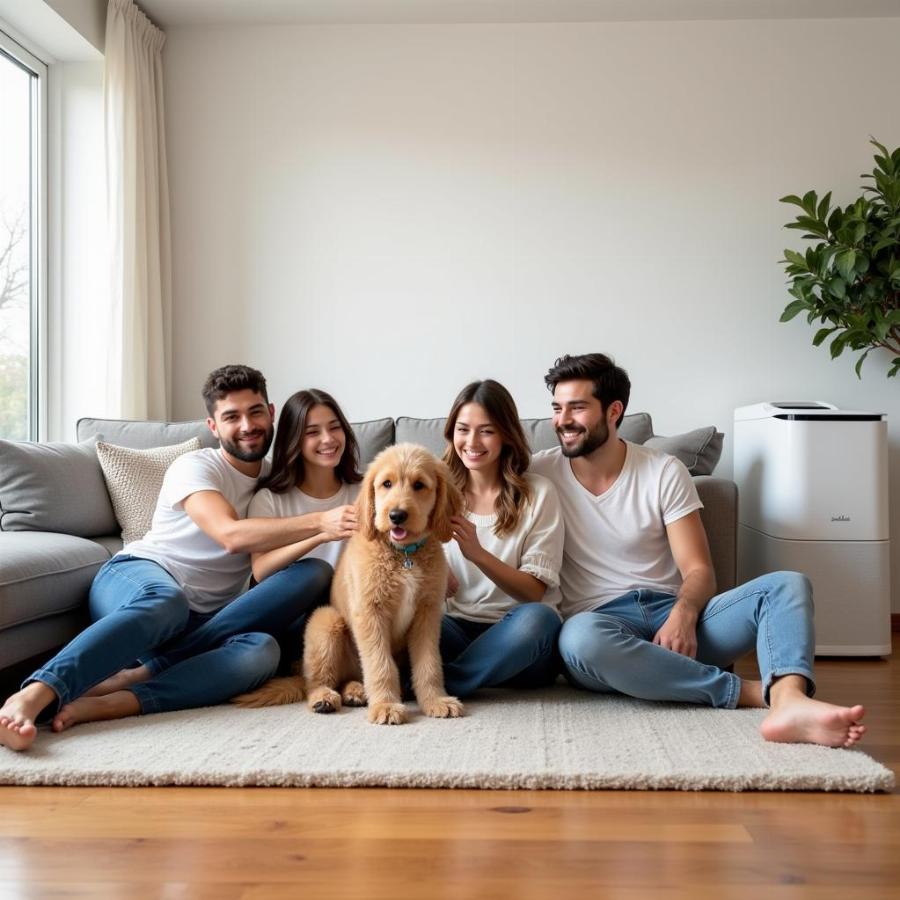Are Goldendoodles truly hypoallergenic dogs? It’s a question many prospective owners ask, hoping to find a furry companion that won’t trigger their allergies. While the idea of a completely hypoallergenic dog is largely a myth, Goldendoodles can be a better choice for some allergy sufferers. This comprehensive guide delves into the facts about Goldendoodles and allergies, providing you with everything you need to know before welcoming one into your home.
Understanding Dog Allergies and the “Hypoallergenic” Myth
People aren’t actually allergic to dog fur, but to proteins found in their dander (dead skin cells), saliva, and urine. These allergens become airborne and can cause reactions like sneezing, itchy eyes, and skin rashes. No dog breed is completely free of these allergens. However, some breeds, like the Goldendoodle, produce less dander and shed less fur, which can mean fewer allergens in the environment. This reduced shedding is often why they’re labeled “hypoallergenic.”
Are Goldendoodles Right for You? Considering Allergies and Lifestyle
Choosing a Goldendoodle based on the “hypoallergenic” label alone can be misleading. Individual Goldendoodles can vary significantly in their shedding and allergen production, depending on their coat type and parentage. If allergies are a concern, it’s crucial to spend time with a Goldendoodle before making a decision. Observe your reaction and ask the breeder about the parents’ shedding patterns.
Beyond allergies, consider your lifestyle. Goldendoodles are energetic dogs that require regular exercise and mental stimulation. Are you prepared to meet their needs? Do you have the time and resources for grooming, training, and veterinary care?
Decoding the Goldendoodle Coat: F1, F1b, and Beyond
The type of Goldendoodle coat greatly influences shedding and allergen levels. F1 Goldendoodles (50% Golden Retriever, 50% Poodle) often have a wavy or curly coat, which sheds less than a Golden Retriever. F1b Goldendoodles (75% Poodle, 25% Golden Retriever) tend to have curlier coats and shed even less. Understanding these generations can help you choose a Goldendoodle that best suits your allergy needs. However, remember that even within these generations, individual coat variations exist.
Grooming Your Goldendoodle: Minimizing Allergens and Maintaining a Healthy Coat
Regular grooming is essential for minimizing allergens and keeping your Goldendoodle’s coat healthy and beautiful. Brushing several times a week helps remove loose hair and dander before they become airborne. Professional grooming every 6-8 weeks can further reduce shedding. Bathing can also help, but use a best deshed shampoo for dogs designed specifically for dogs to avoid skin irritation.
Is a Goldendoodle Hypoallergenic? A Quick Answer
Are Goldendoodles hypoallergenic? Not entirely. No dog is truly hypoallergenic. However, Goldendoodles, particularly F1b generations, often produce less dander and shed less than other breeds. This can make them a better choice for individuals with mild to moderate dog allergies. However, it’s essential to spend time with a Goldendoodle before making a commitment to see if your allergies are triggered.
Living with a Goldendoodle and Allergies: Tips for a Harmonious Home
Even with a lower-shedding dog like a Goldendoodle, implementing strategies to manage allergens in your home can make a big difference. Regularly cleaning your home, using HEPA air purifiers, and washing your dog’s bedding frequently can help minimize allergen levels. Vacuuming carpets and furniture, especially areas where your dog spends a lot of time, is also essential. Consider using hypoallergenic dog shampoos and keeping your Goldendoodle off furniture to further reduce allergen exposure.
 Goldendoodle in a Hypoallergenic Home
Goldendoodle in a Hypoallergenic Home
Choosing the Right Goldendoodle Breeder: Prioritizing Health and Temperament
Finding a reputable breeder is crucial when searching for a Goldendoodle. A good breeder will prioritize the health and temperament of their dogs and be knowledgeable about their lineage and coat characteristics. They should be able to answer your questions about allergies and shedding and allow you to interact with the puppies and their parents. Similar to the snickerdoodle dog breed, responsible breeding practices are essential.
Conclusion
While Goldendoodles aren’t completely hypoallergenic, they can be a good fit for some allergy sufferers due to their reduced shedding. By understanding the nuances of Goldendoodle coats, grooming practices, and allergen management strategies, you can make an informed decision about whether a Goldendoodle is the right companion for you. Remember, responsible ownership involves understanding a dog’s needs beyond the “hypoallergenic” label. This includes providing adequate exercise, training, and a loving environment. This is also true for breeds with unique coats like a dog wavy hair.
FAQ
-
What is the difference between an F1 and an F1b Goldendoodle? An F1 is 50% Golden Retriever and 50% Poodle, while an F1b is 75% Poodle and 25% Golden Retriever. F1b Goldendoodles tend to have curlier coats and shed less.
-
How often should I groom my Goldendoodle? Brushing several times a week and professional grooming every 6-8 weeks is recommended.
-
Are all Goldendoodles low-shedding? No, shedding can vary between individual Goldendoodles.
-
What can I do to minimize allergens in my home? Regular cleaning, HEPA air purifiers, and washing your dog’s bedding frequently can help.
-
How can I find a reputable Goldendoodle breeder? Research breeders carefully, ask about health testing and parentage, and visit the breeding facility. This process is also crucial for those interested in a coconut american girl dog.
-
Are Goldendoodles good with children? Generally, yes. They are known for their friendly and playful nature.
-
How much exercise does a Goldendoodle need? They need a moderate amount of exercise, such as daily walks and playtime.
Beaut Dogs is your trusted source for all things dog-related, providing expert advice and valuable information on various breeds, including the fascinating golden retriever poodle dog. When you need assistance, contact us via Email at [email protected] for detailed and accurate answers from Beaut Dogs.